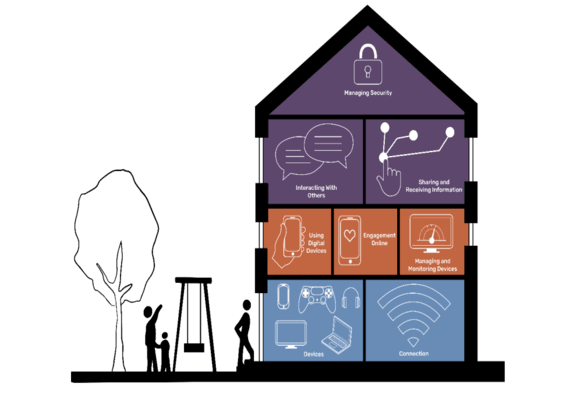On Budget Day, researchers are reminding the Chancellor to keep up with the digital age, and not to forget the impact of the cost-of-living crisis on digital exclusion.
A team, led by the University of Liverpool, with Loughborough University, City University, Good Things Foundation and Critical Research, is leading the way in updating how we define ‘living standards’ in a digital age through research funded by the Nuffield Foundation and Nominet.
Minimum Digital Living Standard (MDLS) for households with children is a ground-breaking, bottom-up approach to define what households need to be digitally included.
The first report from the research, launched today sets out what members of the public – parents, young people – say that families across the UK need today to stay connected.
MDLS sets out a basket of goods services and skills that families need to be digitally included. Every item in the ‘basket’ was carefully deliberated through a structured process, building on the well-established Minimum Income Standard methodology developed by Loughborough University
The next stage of the research will operationalise MDLS into a UK-wide survey involving 1,500 households with children to identify how many households meet or fall below the standard.
MDLS provides a vital benchmark for government, industry and civil society organisations to address digital exclusion and work together to help ensure households have what they need for digital inclusion.
Simeon Yates, Professor of Digital Culture from the Department of Communication and Media at the University of Liverpool said: “We’re really excited to have developed a Minimum Digital Living Standard by talking directly to families to find out what they need to feel connected. We now have a unique benchmark to measure digital inclusion informed by people’s everyday lived experience.
“Our definition is holistic, grounded in everyday life and rooted in what people need to feel included, and participate in the (digital) world around them, so they can connect, engage and not miss out on opportunities.
“With the current cost-of-living crisis placing more and more pressure on household budgets there is an increasing risk that those on the lowest incomes become digitally excluded. Establishing MDLS aims to mitigate this risk and we look forward to collaborating with communities, governments and industry to bring digital inclusion to the forefront of policymaking and work to ensure that MDLS is met in all areas.”
Helen Milner OBE, Group Chief Executive of The Good Things Foundation said: “Minimum Digital Living Standard is a much-needed framework for helping us fix the digital divide.
“Knowing what households truly consider as essential gives us greater direction and provides us, fellow practitioners and policymakers alike with the benchmark we need to address digital inequality and ensure everyone is included in our modern, digital world.”
“We call on the UK Government to follow the lead set by the Welsh Government; use this research to establish a nationally agreed benchmark for digital inclusion, and place this at the heart of a Digital Inclusion Strategy for the UK.”







